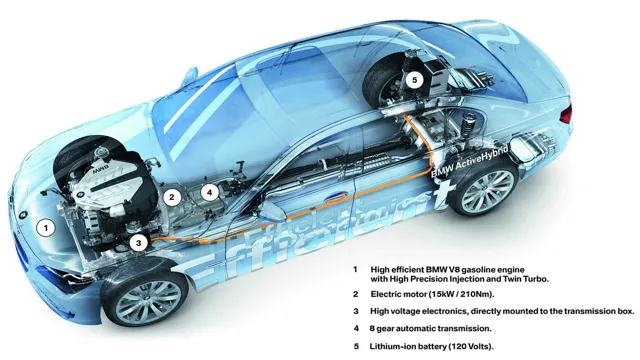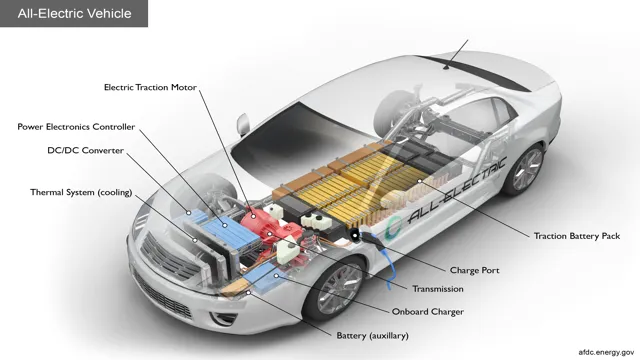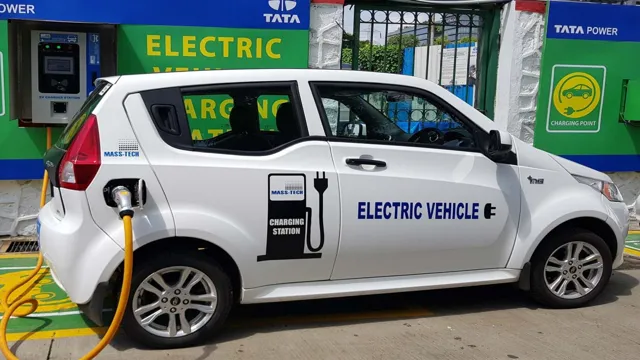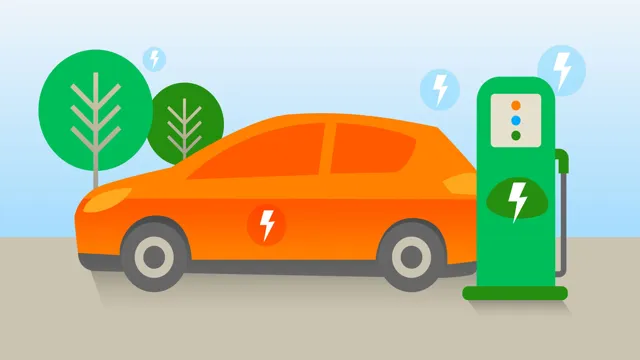Revolutionizing the Road: The Ultimate Guide to Electric Car Technology Explained
Electric cars are becoming increasingly popular due to their environmental friendliness and efficiency. However, many people are not familiar with the technology behind these vehicles. In this blog, we will delve into the world of electric car technology and explain everything you need to know.
From batteries and motors to charging and range, we’ll cover all the basics to help you gain a better understanding of electric vehicles. With this knowledge, you’ll be able to appreciate the benefits of electric car technology, and how it can help save the environment and reduce greenhouse gas emissions. So, let’s get started and explore the exciting world of electric cars!
How Electric Cars Work
Electric car technology explained: Electric cars are the future of sustainable transportation. Unlike conventional gas-fueled vehicles, electric cars use electric motors powered by rechargeable batteries. When the driver presses the accelerator, electricity is drawn from the battery and delivered to the electric motor, which spins a set of gears to turn the wheels.
The best thing about electric cars is that they have high efficiency and produce zero emissions while driving. The battery range is typically around 100-300 miles depending on the model, and it can be recharged at a charging station, which takes less than an hour for a partial charge or several hours for a complete charge. Electric cars also have advanced features like regenerative braking, where the kinetic energy of the car is converted into electrical energy and stored back into the battery, providing extra convenience and efficiency.
Overall, electric car technology is an exciting and rapidly developing field that holds a lot of promise for clean and sustainable transportation.
Electric Motors and Batteries
Electric motors and batteries are the backbone of any electric car. You might wonder, how does an electric car work? The answer is pretty simple, yet quite different from that of a traditional car. Electric cars use electric motors powered by batteries instead of internal combustion engines that use gasoline.
The batteries store the electric charge that runs the motor. When you press the accelerator of an electric car, the batteries send electric energy to the motor, which converts it into mechanical energy and generates the power that propels the car forward. The amount of power generated by the motor depends on the strength of the batteries.
That is why electric car manufacturers strive to build more powerful and efficient batteries that can provide the required range to the vehicle. Overall, electric cars work a bit differently, but their underlying principle is quite easy to understand.

Charging
Charging an electric car is quite different from fueling a traditional gasoline-powered vehicle. Instead of heading to a gas station, you can recharge your electric car at a designated charging station or even at home with a charging station. The charging process typically takes several hours, and the time needed will depend on the car’s battery size and the type of charger used.
There are three types of chargers: slow, fast, and rapid. Slow chargers are typically found at homes or workplaces and can take several hours to fully charge your car. Fast chargers can deliver a decent amount of charge in less than an hour, whereas rapid chargers can do so in a matter of minutes.
Some electric car models even support fast and rapid charging, meaning you can quickly get back on the road. It’s important to note that charging an electric car may not be as frequent as refueling a traditional car, but it requires more planning and organization to ensure you have enough charge to reach your destination.
Benefits of Electric Cars
Electric car technology explained! Thanks to advances in technology, electric cars are becoming more popular due to their sustainability and many benefits. One of the main advantages of electric cars is their eco-friendliness because they emit zero emissions, reducing pollution and improving air quality. Moreover, electric cars are cheaper to maintain because they have fewer parts than conventional cars.
This means less maintenance costs and fewer trips to the mechanic, which saves money in the long run. Additionally, electric cars are quieter to drive than traditional cars, providing a smooth and peaceful ride. These cars are powered by battery packs that can be charged at home or at electric charging stations, making them more convenient and accessible.
With more electric charging stations being installed worldwide, range anxiety is becoming less of an issue for drivers who worry about running out of power. Electric car technology continues to evolve and improve, making them an exciting choice for drivers who want eco-friendly, efficient, and convenient cars.
Emissions Reduction
One of the biggest benefits of electric cars is their ability to significantly reduce emissions. Unlike traditional gas-powered vehicles that emit harmful pollutants into the atmosphere, electric cars rely solely on electricity from batteries for their power. This means they produce no tailpipe emissions and significantly decrease the amount of carbon dioxide released into the air.
In fact, studies have shown that electric cars can reduce greenhouse gas emissions by up to 60% when compared to gas-powered cars. Additionally, electric cars are much more energy-efficient than gas-powered cars, making them better for the environment overall. So not only do electric cars save you money on fuel costs, but they also have a positive impact on the environment and lead to a healthier, cleaner planet.
Cost Savings
Electric cars offer numerous benefits, including significant cost savings for their owners. Compared to traditional gas-powered cars, electric cars require much less maintenance and have lower operating costs. For example, the cost of electricity to power an electric car is about a third of the cost of gasoline for a traditional car.
Additionally, electric cars have fewer moving parts, which means they require less maintenance and are generally more reliable. Overall, the savings in maintenance and operating costs makes electric cars a more cost-effective option in the long run. And while the upfront cost of purchasing an electric car may be slightly higher, there are often government incentives and tax credits available to help offset the cost.
All in all, electric cars provide a sustainable and cost-effective option for drivers looking to save money while reducing their carbon footprint.
Performance and Convenience
Electric cars have numerous benefits, but two that stand out are their performance and convenience. With instant torque, electric cars can accelerate quickly and smoothly, meaning drivers get an immediate response when hitting the accelerator pedal. This gives electric cars a sporty feel and results in an exhilarating driving experience.
Additionally, electric cars have very few moving parts, which means they require minimal maintenance. That’s less money spent on oil changes and other vehicle tune-ups and more time to be spent on enjoying the ride. Plus, electric cars can be charged at home overnight, eliminating the need to make frequent stops to fuel up at a gas station.
The convenience of being able to charge at home or a public charging station means electric cars truly offer a seamless, enjoyable driving experience. It’s no wonder that more and more people are making the switch to electric vehicles.
Challenges Facing Electric Cars
Electric car technology is constantly evolving and improving, but there are still a few challenges that need to be tackled before they become the norm. One challenge facing electric cars is their limited range compared to traditional gas-powered vehicles. While most electric cars can travel around 200-300 miles on a single charge, this pales in comparison to the hundreds of miles that gas-powered cars can travel on a full tank of gas.
Additionally, charging time is another hurdle to overcome. While gasoline takes just a few minutes to fill up a tank, electric cars require several hours to be fully charged. However, advancements in battery technology may soon overcome these challenges.
As more automakers invest in electric car technology, the future looks bright for environmentally-friendly and sustainable transportation. The keyword “electric car technology explained” is relevant to these challenges as it highlights the importance of understanding the advancements and limitations of electric cars.
Range Anxiety
Range anxiety is a major challenge facing electric cars. Many drivers are concerned about the limited range of electric vehicles and the availability of charging stations, which is causing them to think twice before making the switch from gasoline-powered cars. However, advancements in battery technology and the expansion of charging infrastructure are making electric cars more practical and convenient for everyday use.
In fact, some electric vehicles can travel up to 300 miles on a single charge, and fast charging stations are becoming more common on highways and in urban areas. Despite these improvements, range anxiety is still a barrier to widespread adoption of electric cars. That being said, as more people start driving electric vehicles, demand for charging stations will increase, making it easier for others to transition to cleaner, more sustainable transportation options.
Charging Infrastructure
The biggest challenge facing electric cars is the availability of charging infrastructure. While many of us are used to being able to get gas at almost every corner store, finding an electric charging station can be a lot harder. Range anxiety is a real concern for many EV owners who worry about running out of power before reaching their destination.
To alleviate this fear, more charging stations need to be built in public areas, such as grocery stores, shopping malls, and airports. Another challenge is the speed of charging. Unlike filling up a gas tank in just a few minutes, charging an electric car can take hours.
This is where fast-charging technology comes in, which can provide a full charge in about 30 minutes. Overall, charging infrastructure is the key obstacle that needs to be overcome to truly make electric cars a viable option for the masses.
Future of Electric Car Technology
Electric car technology has come a long way in recent years, and it’s showing no signs of slowing down. With advancements in battery technology, electric cars now have longer ranges and better performance than ever before. But the future of electric car technology goes beyond just improved batteries.
Automakers are also working on developing new materials for vehicle construction, more efficient electric motors, and advanced driver assistance systems that can make driving an electric car safer and more intuitive. Furthermore, research is being conducted on wireless charging, which would eliminate the need for plugging in an electric car to charge it. As electric cars become more mainstream, the technology will only continue to improve, making them an even more practical and desirable choice for drivers looking to reduce their carbon footprint.
Conclusion
In conclusion, electric car technology may seem complicated, but it’s really just a matter of breaking it down into its fundamental components. Just like any technology, it takes time and innovation to perfect, but the benefits are undeniable. With zero emissions, lower fuel costs, and improving battery technology, it’s clear that electric cars are the way of the future.
So next time you see a sleek electric vehicle cruising down the street, don’t be intimidated by the technology, embrace the future and the power of sustainable transportation.”
FAQs
What is electric car technology?
Electric car technology refers to the use of electricity as the primary source of power for the vehicle. This is achieved by using electric motors to propel the car forward, powered by rechargeable batteries.
How does electric car technology work?
Electric car technology works by using an electrically charged battery pack to power the car’s electric motors. The car is charged by plugging it into an electrical outlet or charging station, which charges the battery with electricity.
What are the benefits of electric car technology?
The benefits of electric car technology include reduced emissions, better fuel efficiency, lower operating costs, and quieter operation. Electric cars also offer a driving experience that is smooth and responsive.
What are the challenges of electric car technology?
The challenges of electric car technology include limited driving range, longer charging times, and higher upfront costs. There is also a need for more charging infrastructure to support widespread adoption of electric cars.




